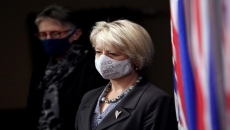UPDATE: VANCOUVER - The head of the Rogers family trust says a British Columbia judge's ruling in his favour resolves important governance issues at Rogers Communications Inc., after a court battle that pitted three of his family members against him.
"I take no joy in the decision or the events of past weeks," Edward Rogers said in a written statement Friday in reaction to a decision over the legitimacy of the company's board after he replaced five independent directors.
"The judgment confirms I acted appropriately, in accordance with (Rogers Communications Inc.'s) articles and applicable corporate law," he said.
Justice Shelley Fitzpatrick's ruling validated the changes made by Edward Rogers in opposition to the wishes of his mother and two sisters, who are also members of the board and the respondents in the case, which led to a power struggle over control of the board.
"I am granting the order sought by Edward, and granting him costs," Fitzpatrick said Friday.
Fitzpatrick did not read her decision in court, saying the reasons were lengthy and it would take hours. Her written ruling was not available to media on Friday.
Edward Rogers said in his statement that the company's focus must be on the business, a return to stability and closing negotiations on a merger with Shaw Communications Inc.
“Our family has disagreements like every other family. I am hopeful we will resolve those differences privately, as any family would. I know every member of our family wants the brightest future for Rogers Communications."
Lawyer Stephen Schachter, who represents family matriarch Loretta Rogers and her daughters Melinda Rogers-Hixon and Martha Rogers, told the court they will appeal the ruling.
Schachter argued in court Monday that his clients questioned Edward Rogers' leadership because his arbitrary ousting of independent directors violated the company's governance practices.
Ken McEwan, a lawyer for Edward Rogers, argued this week his client used his authority as chair of the family trust, which has 97.5 per cent of the voting rights.
McEwan said Edward Rogers also had that power under a unique corporate law in B.C., where the Toronto-based company is incorporated, and that the actions taken by his client are the "default mode" of resolution offered by the B.C. Corporations Act.
Loretta Rogers said in her affidavit filed last week that her son "secretly" planned to remove the majority of independent directors with his own nominees, going against the company's governance structure to include the votes of shareholders.
She said Edward Rogers also failed to abide by her late husband's 2006 "memorandum of wishes," complete with checks and balances aimed at preventing such problems by the chair of the family trust. Ted Rogers died in 2008.
"Nothing worried him more than a needless public spectacle," she said.
Carol Liao, associate professor at the University of British Columbia’s Allard School of Law and director of its Centre for Business Law, said Fitzpatrick's ruling was not surprising because corporate law provides room for companies to design their own governance mechanisms.
An article in Rogers' governance structure allows for the removal of directors by ordinary resolution and for vacancies to be filled at the same time, she said.
"We have many corporate statutes that provide default provisions, with a choice for businesses to bury things in their governance documents, in their bylaws," Liao said. "Here's where you see these black and white laws permitting companies to design mechanisms that may butt up against what are deemed as good governance practices."
The crux of the case also comes down to the fact that Edward Rogers, as chair of the family trust, controls 97.5 per cent of the voting shares, Liao said.
"All the power moves really were at the trust level."
Liao called the use of Ted Rogers' "memorandum of wishes" a weak tactic, saying a publicly traded company can't be controlled from the grave.
McEwan also told the court earlier that the family patriarch's document had been treated as confidential up until the hearing, that it wouldn't meet a legal test and wasn't known to all shareholders.
However, Loretta Rogers maintained in her affidavit that her son had waged an "unconscionable" campaign to oust board members, which was inconsistent with his duties and limited authority as chair of the family trust.
She also said her son planned to fire CEO Joe Natale without the board's input and misled her about Natale's job performance as a reason to replace him with chief financial officer Tony Staffieri.
Natale was ultimately terminated and Staffieri was fired, further rocking the executive team at the telecommunications empire.
EARLIER STORY:
VANCOUVER - A British Columbia Supreme Court judge is expected to announce a decision today in the battle over control of the board of Rogers Communications Inc.
Justice Shelley Fitzpatrick must rule on whether a newly constituted board under the leadership of Edward Rogers is legitimate after he removed and replaced five directors, while three of his family members maintain the decision should have involved a vote by shareholders.
Ken McEwan, a lawyer for Edward Rogers, argued in court this week his client used his authority as chair of the trust that has 97.5 per cent of the voting rights.
He told a hearing on Monday that Edward Rogers also had that power under a unique corporate law in B.C., where the Toronto-based company is incorporated.
But a lawyer representing Rogers' mother and two sisters argued the independent decision went against the company's governance practices and the wishes of deceased patriarch Ted Rogers.
The spat between two factions of the Rogers family empire has spilled from the boardroom to social media and into a courtroom amid the company's plans to buy rival Shaw Communications Inc. for $26 billion pending regulatory approval.






